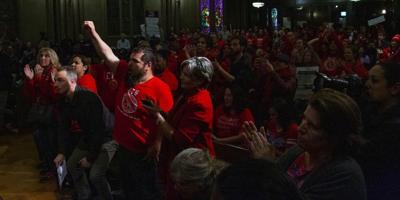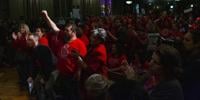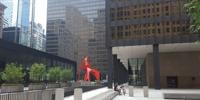
Members of the Chicago Teachers Union and supporters rally in 2019.
Editor’s note: This story has been revised from an earlier version to include a statement from lawyers for the plaintiffs which was received after the story had published.
CHICAGO - Parents of school children enrolled in Chicago's Public Schools don't have the legal ability to sue the Chicago Teachers Union for illegal strikes, such as the one the parents said CTU staged in early 2022 in a bid to keep Chicago's schools closed amid the Covid pandemic, even as the rest of the country was returning to normalcy, a Cook County judge has ruled.
In response, attorneys representing the parents have said they intend to appeal the decision, asserting the judge’s ruling ignored important constitutional provisions.
On May 8, Cook County Circuit Judge Daniel Kubasiak sided with the CTU and its current and former union presidents, dismissing the lawsuit brought by parents over the allegedly illegal strike.
In the ruling, Kubasiak agreed that allowing the parents' lawsuit to continue would conflict with state educational labor law and would undermine the ability of the CTU and other teachers unions to deal directly with school boards to resolve supposed conflicts, no matter if those disputes are genuine and legal or manufactured and outside the law.
The lawsuit, filed in Cook County Circuit Court in February 2024, sought to make Chicago's powerful teachers union and current and former presidents Stacey Davis Gates and Jesse Sharkey, pay at least $250 million for causing learning loss, income loss and general headaches for Chicago Public Schools students and their families when the union executed a labor action in 2022 to protest CPS' return to full-time, in-person learning.
The lawsuit asserts the CTU, Gates, Sharkey and the CTU's parent union, the American Federation of Teachers, conspired to call an illegal strike in December 2021 and January 2022 because the CTU claimed CPS did not do enough to protect teachers from the spread of Covid at that time.
In early 2022 - just shy of two years from the onset of the Covid-19 pandemic - CPS had announced a planned return to in-person learning. At the time, the school system stood out as one of the last in the country to restore normalcy to public education for hundreds of thousands of students in the country's third largest city, after enduring more than a school year's worth of disruption during the pandemic.
The slow return to in-person learning was heavily credited not only to state and local public health restrictions imposed on all levels of society by Gov. JB Pritzker and then-Chicago Mayor Lori Lightfoot, among others, but also to heavy resistance by the CTU, with the support of allies in the national teachers union. The CTU, for instance, notably posted on social media that calls to return to in-person learning were "rooted in sexism, racism and misogyny."
However, those delays in returning to in-person schooling likely affected low income racial minority students the most, according to the complaint, leading to substantial learning loss.
The complaint cited academic analysis demonstrating that such learning loss further leads to substantial income loss later in life.
That damage was allegedly exacerbated by a labor action lasting five days, from Jan. 5-11, 2022, in which the CTU refused to return to the classroom to teach students until it secured certain concessions from CPS.
CTU notably did not describe the action as a "strike," instead repeatedly referring to the refusal to report to classrooms, as ordered by CPS, as a "remote learning action."
The lawsuit, however, said the action by any name amounted to an illegal strike. They noted both former Mayor Lightfoot and CPS referred to the action as "an illegal work stoppage."
The labor action further was carried out with approval from only 73% of CTU members, short of the 75% required by state law to authorize a strike, the complaint notes. Further, CTU never sent a notice of its intent to strike, nor did it allow 10 days to pass between the vote to authorize the labor action and the beginning of the labor action.
The plaintiffs asserted this violates the CBA between CTU and CPS, and thus, violates the contractual rights of CPS students and families, whose interests the CTU claims to also represent in its CBA.
The lawsuit alleged the illegal actions caused a widespread public nuisance and violated the contract rights of CPS students and families, who should be considered third-party beneficiaries of the collective bargaining agreement between CPS and the CTU.
The lawsuit asserted the allegedly illegal strike harmed families, unexpectedly upending their lives for days, costing them income and forcing them to pay for child care, while allegedly inflicting further emotional and psychological harm and learning loss on students already reeling from many months of remote learning, school shutdowns and other societal restrictions.
The lawsuit sought to expand the action to include more than 290,000 CPS students and their families.
The plaintiffs were represented in the action by attorneys Patrick Hughes and Daniel Suhr, of the firm of Hughes & Suhr LLC, of Chicago.
At the time the lawsuit was filed, Suhr said the lawsuit was "about restoring what was unjustly taken from" students and their families by the CTU's alleged illegal strike.
In response, the CTU asked the court to dismiss the lawsuit, asserting the parents had no legal right to sue them for allegedly illegally striking.
The CTU asserted such disputes over school strikes and other "labor actions" are controlled by the Illinois Education Labor Relations Act (IELRA), which means the dispute doesn't belong in court at all.
The CTU further argued parents generally have no right under state law to step into the middle of dispute between their school board and a teachers union, because it would undermine the authority of the school board, which they said alone possesses the authority under Illinois law to challenge a labor action as illegal.
They noted the CTU and CPS board had settled their dispute over the allegedly illegal strike in July 2023, and the Illinois Education Labor Relations Board had signed off on the agreement.
Therefore, the union argued, the matter should be considered legally resolved and parents now have no legal right to come after them for the allegedly illegal strike.
In his ruling, Kubasiak sided completely with the CTU.
"The Court agrees with CTU that to allow Plaintiffs' case to proceed would undermine the IELRA Board's and CPS' control over education and education labor issues," the judge wrote. "The Court finds that allowing this case to proceed would set precedent to allow parents of students to control how the CTU interacts with CPS leadership and vice versa."
The judge also agreed with CTU that Davis Gates and Sharkey cannot be sued as individuals for actions taken by the union.
The CTU was represented in the case by attorneys Robert E. Bloch and Josiah A. Groff, of the firm of Dowd Bloch Bennett Cervone Auerbach & Yokich, of Chicago.
In a statement to The Record, a spokesperson for the Hughes & Suhr firm said they intended to soon appeal the ruling.
“We strongly disagree with the Court’s ruling, which ignored important arguments, including and especially that the Illinois Constitution mandates a remedy for the damages this illegal strike caused to the students and their families.






